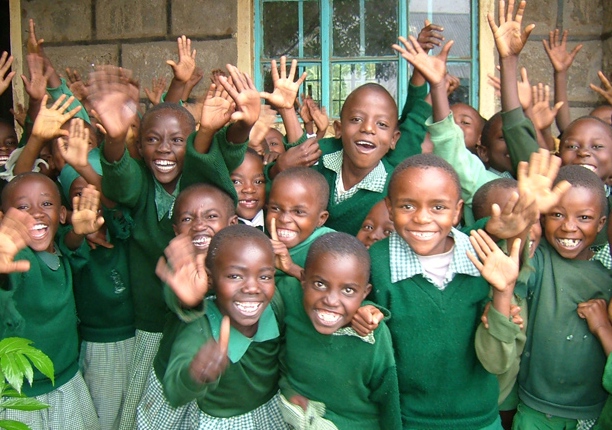Nigeria: 5 Years After Chibok, Children Still At Risk
The five-year anniversary of the Chibok school abduction is a reminder that schoolchildren remain vulnerable to attacks and abductions by Boko Haram fighters in Nigeria’s beleaguered northeast region, Human Rights Watch said today. The lack of information on the whereabouts of 112 of the schoolgirls, as well as hundreds of other children abducted from Damasak, underscores the continued suffering of their families and the continued risk of new abductions.
The abduction, on April 14, 2014, of 276 schoolgirls from the government-owned Chibok Secondary school in Borno State caught the world’s attention and sparked a campaign for their release. Human Rights Watch research, however, showed that Boko Haram’s abductions of women and girls began before the Chibok incident and have continued. According to a UNICEF report, the group abducted more than 1,000 children between 2013 and 2018.
“Boko Haram continues to prey on women and girls as spoils of war despite claims by the Nigerian government that it has defeated the group,” said Anietie Ewang, Nigeria researcher at Human Rights Watch. “The Nigerian authorities should make it a priority to protect vulnerable groups from harm by all sides in the northeast conflict.”
In addition to the Chibok abductions, Boko Haram fighters abducted more than 300 children from Zanna Mobarti Primary School in Damasak in March 2015 after Chadian forces expelled them from the northern Borno town. And on February 19, 2018, in a brazen operation reminiscent of the Chibok school attack, insurgents abducted 110 schoolgirls from the Government Girls Science and Technical College, in Dapchi, Yobe State.
While 161 of the Chibok schoolgirls and 101 of the Dapchi girls have escaped or been released through government negotiations, there has been no word from the government about the missing Damasak children or the remaining 112 Chibok girls. Media reports said that the insurgents did not release Leah Sharibu, the only Dapchi schoolgirl still in their custody, allegedly for refusing to renounce her Christian faith for Islam. Five of the girls allegedly died before arrival at the Boko Haram camp, while three others remain unaccounted for.
The chairman of the Chibok Parents Association, Yakubu Nkeki, told Human Rights Watch that an officer from the new Chibok Desk at the Federal Ministry of Women Affairs, met with his members in December 2018. The officer gave each parent the equivalent of US$12 in Nigerian naira and some food items, but she neither provided updates on recent efforts to secure the release of the remaining girls, nor offered the families any counselling. Nkeki said that 34 of the parents have died of various causes in the past five years, including trauma associated with the abduction. “The parents of the girls who are yet to be released are traumatized,” he said. “It is really difficult for them and I feel bad calling them for our meetings because there are no updates.”
These abductions are emblematic of Boko Haram’s attacks on education. Boko Haram in Hausa language means “Western education is forbidden.” Human Rights Watch has documented Boko Haram’s brutal assaults on schools, students, and teachers in northeastern Nigeria since 2009. In a turnabout, the Nigerian Prisons Service reported on April 8 that up to 157 convicted Boko Haram fighters have embraced education as part of a deradicalization program.
Nigeria announced the Safe School Initiative in 2014 with an initial fund of 3.2 billion naira (US$10 million) from the federal government and private donors to ensure a safer school environment for children, especially in conflict areas. Nigeria also endorsed the international Safe School Declaration in March 2015, as a commitment to ensuring that schools will be able to continue to operate during armed conflict. In December, the Education in Emergencies Working Group under the Education Ministry submitted a proposal to the Defense Ministry to amend the Armed Forces Act to ban requisitioning schools or universities to billet or accommodate soldiers.
One hundred of the released Chibok girls are currently enrolled on scholarship in remedial classes and degree programs at a Nigerian university. Dr. Allen Menessah, the director of media and communication for the Kibaku Area Development Association, an organization of indigenous groups in the Chibok area, told Human Rights Watch that the destroyed Chibok Girls’ Secondary School is yet to be completely rebuilt. Its students have been moved to the nearby Government Day Junior Secondary School, where they are able to study for three hours a day.
In July 2018, Nigerian Police announced the arrest of eight suspected Boko Haram fighters who were allegedly involved in the 2014 Chibok school attack. In June 2018, during trials marred by irregularities in a military base in Kainji, northcentral Nigeria, at least one defendant was convicted and sentenced to 20 years in prison for his alleged role in the attack. None of the victims or communities affected by the attacks were involved in the trials.
“While some notable progress has been made toward rescuing abducted children and bringing their abductors to justice, many others remain unaccounted for and their families have been left without adequate support,” Ewang said. “The Nigerian authorities need to live up to their commitments to provide safe a learning environment and ensure justice for victims of these abuses.”





